This article was written with the assistance of Police Officer Javier Acosta who has been with the San Jose Police Department for close to 24 years. He is currently assigned to the department’s recruiting unit which hires for 3 academies per year with 50 recruits each for a total of 150 recruits. They also hire 10-20 laterals per year. The San Jose Police Department (SJPD) campaign is designed to attract a diverse group of recruits from all over the country. While the information below is specific to the SJPD, much of the information applies to the hiring process for agencies around the county and will give you a thorough understanding of how to get a job as a police officer.
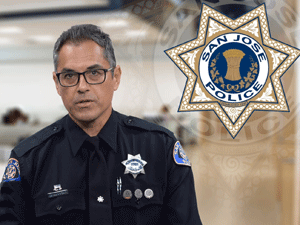
The SJPD recognize the sacrifices that men and women have made for our country and want to provide some incentives for military personnel to join their agency. One incentive offered for military veterans that have served in the Air Force, Army, Navy, Marines, or Coast Guard for four years of active duty is waiving the minimum college requirements to enter their academy. They also provide veteran preference test points. During the middle of the testing process, they have the oral board interview and they provide five additional preference points to the candidate’s overall score if you’re a military veteran, or a spouse of a military veteran.
The hiring process for SJPD, from the time an applicant submits their application to the time they would receive an actual academy start date or offer letter of employment can take anywhere up to nine months.
Steps of the Hiring Process
The police hiring process starts with a two-part application. The initial application is to obtain some contact information and also to ensure that the candidate possesses the minimum qualifications (See Police Requirements). There is also a supplemental application, which is a questionnaire that has roughly around 39 questions that are designed as a pre-screening (drug history, work experience, criminal record, etc ). It’s a multiple choice questionnaire, and some of the answers allow for an explanation.
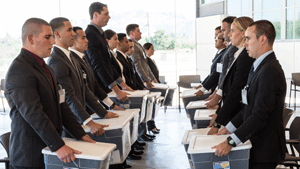
Once an applicant enters the background process, there will be an additional background assessment and additional forms for the candidate to complete (polygraph questions, fingerprints, interviews with spouses, coworkers, neighbors, et cetera). You may want to check out how thorough are police background tests. Eventually, the applicant ends up at the hiring board, a group of members who make selections from an eligibility list. If an applicant is not selected, there are instructions as to when the applicant can reapply. If the applicant is selected, there are three additional steps before receiving a conditional offer of employment, starting the academy and getting hired as a police officer.
The Application and Supplemental Application
The application and supplemental application processes are at the beginning stages of the hiring process and it is very important that applicants complete both of those items in their entirety, without omitting any background information. The application is for obtaining some contact information and ensuring that an applicant meets the minimum qualifications. The supplemental is a questionnaire that is designed to pre-screen. It is 39 multiple choice with some of those questions allowing for explanations. It is very important that applicants are honest, and provide detailed and thorough information when completing both of these items. Purposely omitting information about your background that you know would disqualify you, would be considered a disqualification by itself. Intentionally misleading in the application, lying, or failure to be truthful can be a disqualifier. Information such as omitting a prior arrest or not being truthful about an employment termination, could disqualify a candidate.
Applicants are encouraged to be honest because in some cases, candidates intentionally omit or don’t disclose something that they think is severe. But, in reality, the department doesn’t look at it as a major disqualifier, but the candidate thinks it is. Thus, they end up getting disqualified when, if they had been truthful, it would not have been an automatic disqualifier. Being truthful is always key when completing the application and the supplemental application.
Written Exam
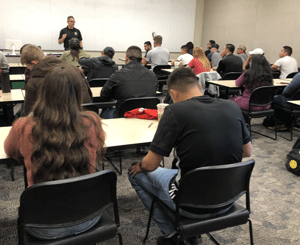
SJPD hosts the PELLET-B written exam at their police academy once a month. The other written exam that is accepted is the National Testing Network Frontline (NTN). The NTN is the police entrance level exam that is proctored all over the country and applicants can take the exam remotely. The PELLET-B is not available virtually and must be taken in person. The PELLET-B can be taken every 30 days, the NTN every 90 days. When candidates don’t pass the written exam the first time, they are encouraged to take it again. There is no record of how long it took an applicant to pass it. All SJPD asks for is a passing test.
Physical Agility
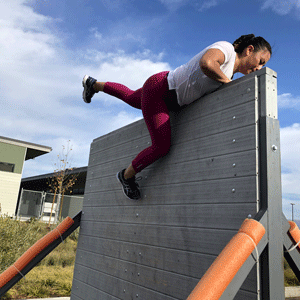
Numerous police academies across California proctor the WSTB, but if a candidate is in the testing process with the SJPD, the candidate can take the test from them (SJPD) free of charge. Many other academies have a fee for taking the test. On the flip side, if a candidate goes to any academy and takes the physical agility, then they can provide those results to whatever agency they’re applying with. Conversely, if an applicant takes it with SJPD, SJPD does not share the results with other departments.
The biggest challenge that candidates have with the physical agility is passing the solid fence climb. Applicants start at the five yard mark, run five yards, approach the six foot solid fence and climb over it, then continue running for 25 yards. The average time is 7 to 10 seconds.
Oral Board Interview
Once a candidate has submitted an application, passed the supplemental application, passed a written exam, and passed a physical agility exam, the next step in the process is the oral board interview. The oral board interview is designed to evaluate the applicant’s ability to communicate effectively in a clear and concise manner. It also evaluates the applicant’s ability to convey their thoughts and ideas in a logical and organized manner. The oral board interview score establishes an eligibility list for future hiring. The interview is approximately six questions that may or may not be police related. The oral board interview is designed to add some stress to the candidate to see how they will act and see what decisions they will make, and to demonstrate their communication skills during an in-person interview.
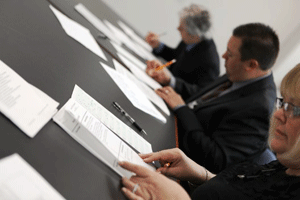
The oral board interview is top of the list for importance, above the written and the physical agility. The oral board interview score carries a lot more weight during the testing process. Also, applicants cannot take the oral board interview in the same testing cycle if they didn’t pass, whereas the written exam and physical agility test can be taken again every 30 days.
Preparing for the Oral Board Interview
Like most interviews, preparing for the police oral board interview can be quite challenging. Here’s how to pass a police interview. Many applicants don’t have the experience or the confidence of just speaking to people one-on-one. Some people have challenges speaking well in a public setting, being comfortable in an oral board interview, and having confident body language and the tone of speech and the proper rate of speech as to answering the police interview questions . There are different ways to study for the oral board interview, but it is absolutely crucial that applicants put a lot of effort into preparing for this difficult interview.
What to Research for the Oral Interview
Candidates are encouraged to do research on the police department that they’re interviewing with, to have some basic knowledge of the city, and the community. It can be important to know who the mayor is, the community demographics, and learn some of the issues that are happening locally. Know what the department is doing as far as community outreach. It’s always important to be able to show the interview board that you’re aware of some of the issues that are going on, and what you would do as a police officer to help bridge that gap between the community and the police department.
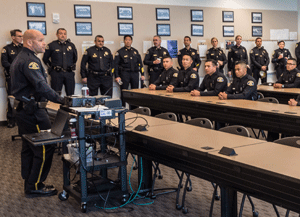
When a candidate is not prepared for the interview, it is very obvious to the board. Some candidates simply provide an answer such as, “I’m sorry, I don’t have the answer to that question right now.” There are awkward long pauses or, unnecessary blank stares. It is really unfortunate when a candidate has not prepared because it shows in the interview.
Passing of the interview is a score of 70% or greater, however, candidates who score in the 80s, 90s, and 100s will be backgrounded.
Background Investigation
Once a candidate passes the interview, depending upon their score, they may advance to the background process. A backgrounder will notify candidates and the agency will provide additional testing. Additional documents will also be requested. There will be a one-on-one meeting with the backgrounder, a polygraph examination, fingerprints, and credit checks. The candidate will receive the Personal History Statement (PHS), which is a fairly extensive document that needs to be completed. The candidate will be asked to provide references. There’s an inquiry into the applicants driving history, educational transcripts, one-on-one meetings with roommates, landlords, friends, and possibly acquaintances.
Candidates are then presented to the hiring committee by the backgrounders based on the score they received on their oral board interview. The backgrounders are given a few minutes to offer a little insight into their candidate and then the committee decides whether or not the candidate is selected.
When the candidate is selected, they are notified via a formal email. That letter is a condition offer of employment, contingent upon passing the medical exam and the psychological exam.
The Psychological Exam
The psychological exam consists of two parts, a written exam and an interview. The written exam has approximately 500 questions. The interview is one-on-one with the psychologist. See police psychological test questions. If a candidate does not pass their initial psychological exam, the candidate can appeal it, and in some cases, the agency will pay for another assessment from another psychologist.
Medical Exam
The medical exam will consist of a doctor’s visit, where they check vision, hearing, exam lungs, do lab work on blood, urine, etc.
Once a candidate has successfully passed those three items, they will receive another official letter providing an academy start date. If an applicant is not selected, it doesn’t necessarily mean that they were disqualified, because that would have taken place earlier in the process. It just means there were a lot of very great candidates and the agency could only put a certain number of candidates into the academy. See how long is police academy.
It is important for candidates to have patience, be flexible, be understanding and put 110% effort into the process. You’ve taken the first step by reading these tips for becoming a police officer. This is the most noble profession applicants will enter and honesty, integrity, and decision-making starts with the application process. If a candidate is honest, does the right thing, and gives it 110%, they will have a good experience with the testing process and hopefully enter the greatest profession. It could take candidates up to nine months to get a job in law enforcement. However, what they are going to get in return is 25 to 30 years of fulfilling work as they move up in the agency and up the sheriff ranks.
Related Links

 Joseph Libowsky,
Joseph Libowsky,